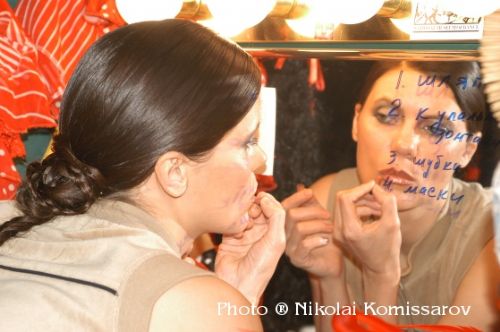Elena Sosnina
ABOUT
Elena Sosnina

Elena Sosnina was born in the year 1966 in the small town of Leninskoye located in the Far Eastern area of Russia. Her parents were well educated Soviet workers. Her mother was a teacher of Russian language and literature, in the same school for over 40 years, and her father held a position as Head of the State Veterinary Department for the entire Far East Region.
When her family moved to the city of Khabarovsk, the capital of the Khabarovsk Region, Elena's childhood became filled with a rigid and disciplined Russian schooling, a book-worm kind of reading, singing in vocal groups, and study in her much adored ballet and folk dancing. After graduating high-school she attended a modern dance studio, held by the professional Ensemble "Far East". She was invited to perform with it, but was convinced by her parents not to pursue an artistic career. Instead she went to a technical college, studying Construction Engineering by day, but by night, continued dancing in the Union sponsored Public Theater of Ballet.
In her graduating year of college, Elena was invited by her long-time ballet teacher to work as a dancer in the Theater of Cabaret in the town of Yalta on the Black Sea. This decision was made instantaneously, and with much parental disdain. Elena dropped out of college and moved to the other side of Russia. There, she was thrown into the deep waters of show business, sometimes suffering ridicules from her older colleagues, but never regretting her decision to dance professionally. In 1989 Elena traveled to Moscow, and then later to New York, as part of a performing Cabaret act. She entertained multicultural audiences and studied different styles of dance in New York City based dance schools.
In 1991 Elena permanently immigrated to the United States. Seven years later, and after hundreds and hundreds of performances of routine nightclub work, Elena began to exhibit a strong interest in reviving one of her favorite pastimes from back in Russia, writing poetry. Her daily life was continuously filled with a foreign tongue, and she wanted to preserve her native language, keeping it sharp by constantly exercising it. The Internet has connected her with other poetry-lunatics, and opened enormous possibilities for self-education in this area.
Elena has lived through many hobbies, and it's hard to tell where her main interest lies, because she has taken each one of them extremely seriously.
She is self-taught in photography, crafts, nutrition, and yoga. She has also taken vocal and martial art lessons.
Elena has always considered herself a "lifelong dilettante" and has always felt very humbled towards any attention directed towards her talents. If not for the artistic guidance and/or pressure of her fellow artisans, she truly would still be "in the closet". Thankfully she now shares her talents with us.
Her photographic images appear simple and carefully cleaned from unnecessary details, her poetry shines with neologisms, plays on words and skillful idiom destruction and reconstruction, her dancing is always "full out", regardless of injuries and fatigue, and her singing is free of vulgarity and filled with emotion.
Enjoy!
In 2009 Elena Sosnina published her first book of poetry The closet of poems
( Illustration and force field by Izya Shlosberg).
From this book you get a feeling of a constant searching. What is the meaning of life? What am I? What is After? What are the answers to these philosophical, yet primal human questions? The poems represent this quest in a cluster of rhythmically fascinating, cleverly rhymed, and emotionally charged poems, in which the characters, very well defined and almost touchable, are immediately recognized by the readers in an "It's all about me!" kind of fashion. All this done within an array of feelings, situations, and places, outlined in different chapters (Rhymograffiti, Sansara, Erodinamics, Russian club, Dans-class) giving the audience a chance to get into the poet's very quarters, to only find themselves, speechless and deeply moved, when the author disappears, becoming just a dancing wind in between words.



